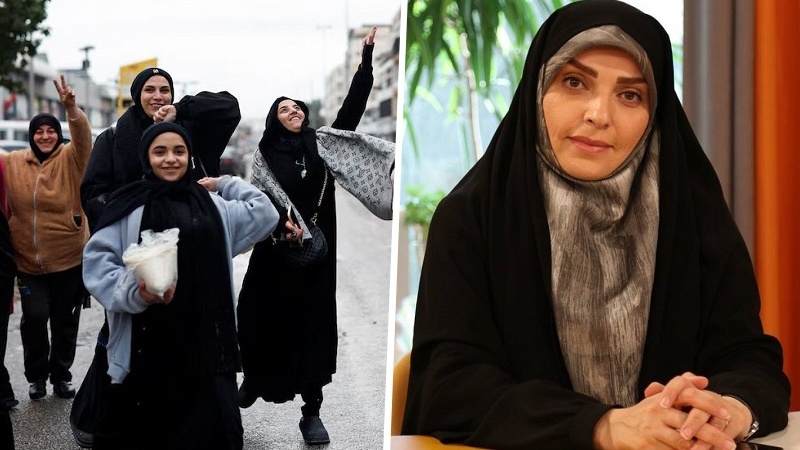Raheleh Aminian, as the first woman from IRIB, went to Lebanon during the war time to narrate the situation of the Lebanese women under bombs. In Dahieh of Beirut, Aminian talked with the women who, in her words, are now common in having the epithets like a martyr's sister, wife or mother.
In view of this, Iranian daily Farhikhtegan has conducted an interview with Raheleh Aminian, part of it has chosen here:
Q: What was your take during these several days that you met with the people of Lebanon?
A: When I arrived in Beirut, I saw a calm city where life was going on. But, when I reached Dahieh and south of Lebanon, the conditions were quite different. Houses were either ruined or damaged; or they were not ruined but there was no sign of life in them and all of them had been evacuated. They [Lebanese people] didn't like to be called "homeless" and "refugee" at all. They would say, "We are Nazehin (migrants)." What I saw was an astounding pride to prove that "We won't be tired with these problems".
Q: How did you find the reaction of people after the ceasefire was announced?
A: I personally thought that the news of ceasefire would make the great family of Lebanese Hezbollah sadder because of losing their dear ones, especially Seyyed Hassan Nasrallah and senior leaders and commanders of Hezbollah. But, since the moment that voices of putting ceasefire into effect were heard, whatever I saw was calm; that they wanted to come back to their homes and life.
I asked some persons, "Do you know anything from your house and life?" They answered, "It has been ruined."
I asked, "So, where will you return?" They answered, "We will go and start life over the same ruins and will build our houses and life ourselves."
I talked to a martyr's wife whose 40th day ceremony was on last Saturday. She was 29 years old and had four children. Her youngest child was 1 year and 3 months. I thought that she might be unhappy upon hearing the news of ceasefire, but she said resolutely, calmly, patiently and steadfastly, "We are very happy with this news as we know that whatever the senior commanders and decision-makers of Hezbollah determine for us is the best and most accurate decision."
Q: What image has remained indelibly in your mind in these days?
A: Most of the resistance women whom I talked with were either a wife, a mother, a daughter or a sister of a martyr. The common thing among most of the Hezbollah women is that they have one of these titles. Our speech was about their martyrs, the memories before martyrdom to the memories of hearing the news of martyrdom. Most of them have not seen their martyrs despite a considerable lapse of time and most of the martyrs have been buried in some areas as trust.
What made me very astounded was when they spoke of the moment of hearing the news of martyrdom of their dear ones. They would unanimously say that they had sought intercession with Lady Zahra and Lady Zeinab (Peace upon them) and they were miraculously patient. I saw and I see the patience of Zeinab, in the true sense of the word, in the women of Hezbollah. During these days, I told them several times that the word "resistance" is very little for them.
Q: How was the view of the Lebanese people on Iran and its people after this war?
A: Whatever I saw was favor and kindness. When they noticed I am an Iranian woman who has come to Beirut for the first time in these days, they showed a lot of mercy and conveyed a sisterly feeling to me. When I asked them if they were informed of the campaign of "The Empathizer Iran", especially the women's participation in the campaign of "Gold Donation", they said that they knew and were very appreciative. They thanked and said that they would pray for the Iranian people in every moment of their lives, particularly for the Iranian women who are making effort for them in these days.
Q: How did people react to the martyrdom of Seyyed Hassan Nasrallah, especially, now that they are getting prepared for his funeral?
A: This name had become a codename between me and these ladies so that as soon as hearing it we would cry together. They would wail impatiently. They would mourn and I would shed tears with them. Yet, all of them believe that Seyyed Hassan Nasrallah deserved martyrdom and, that's why, their faces were manifestly happy.
I have no doubt that a glorious funeral will be held. I mean a unique funeral will be held in Beirut.
/129

